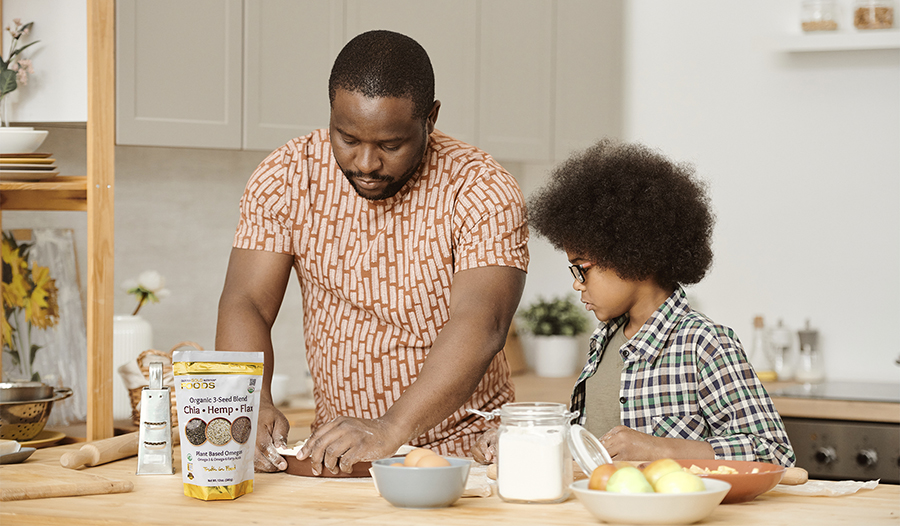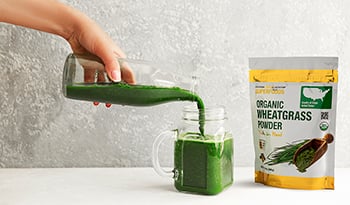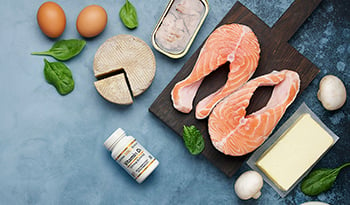Coaceți deserturi mai sănătoase cu aceste 7 schimburi ușoare de ingrediente

Coacerea este o distracție preferată pentru mulți oameni. Poate fi reconfortant, poate oferi o activitate plăcută de care să te bucuri alături de cei dragi sau poate fi modalitatea ta de a arăta familiei și prietenilor că îți pasă de ei. Deși toate acestea sunt rezultate pozitive asociate cu coacerea, consumul acestor delicii indulgente nu este adesea cel mai bun pentru sănătatea noastră. Vestea bună este că există o mulțime de modalități de a vă transforma produsele coapte în versiuni mai sănătoase, care sunt încă delicioase. Indiferent dacă coaceți pentru propria plăcere, faceți bunătăți pentru clasa școlară a copilului dvs. sau vă pregătiți celebrele delicii de sărbători, iată trucurile mele de top pentru a face deserturi și produse de patiserie mai sănătoase, înlocuind câteva ingrediente bune pentru dvs.
1. Făină de hrișcă
Cele mai multe produse de patiserie necesită făină universală sau de patiserie, niciuna dintre ele nu oferă o densitate mare de nutrienți. Din fericire, există multe schimburi pe care le puteți folosi în locul acestor făini tradiționale de copt. Schimbul meu de top pentru făina universală este făina de hrișcă și din motive întemeiate. În ciuda numelui său, hrișca nu conține gluten, o proteină care se găsește în mod natural în grâu, orz și secară la care mulți oameni au sensibilitate. Pentru cei cu alergie sau intoleranță la gluten, hrișca este o opțiune excelentă. Pe lângă faptul că este fără gluten, făina de hrișcă posedă mai mulți nutrienți decât făina tradițională de copt.Fibra este nutrientul pe care îl veți găsi mult mai concentrat în hrișcă, făcându-l un schimb mai sănătos. Fibrele sunt un nutrient important pentru îmbunătățirea regularității digestive, creând un sentiment de plenitudine și chiar poate ajuta la gestionarea nivelului de colesterol din sânge. În cantități concentrate, hrișca poate oferi o consistență oarecum cretoasă, așa că puteți începe prin a schimba doar jumătate din făina dvs. universală cu făină de hrișcă pentru a vă asigura o textură de care vă bucurați. În plus, puteți combina hrișca cu alte făini sănătoase, cum ar fi făină de migdale pentru o textură dorită și un impuls de nutrienți, cum ar fi grăsimile sănătoase.
2. Fructe amestecate
Piureul și fructele amestecate, cum ar fi sosul de mere, sunt o alternativă minunată la uleiul din produsele coapte. Deși există multe uleiuri care conțin grăsimi sănătoase, cum ar fi ulei de măsline și ulei de avocado, acestea nu sunt de obicei ideale pentru coacere datorită aromelor lor mai vizibile. În mod tradițional, uleiurile vegetale și canola sunt cele mai frecvente opțiuni utilizate în coacere datorită aromelor lor neutre; cu toate acestea, nu oferă atât de multe atribute pozitive de sănătate în comparație cu alte uleiuri. Pentru a evita această situație dificilă a uleiului de utilizat în produsele de patiserie, puteți schimba tot uleiul pentru sos de mere sau alte fructe amestecate. Căutați opțiuni cu zero grame de zahăr adăugat, dar nu ezitați să experimentați cu opțiuni mixte de fructe. Există multe soiuri de fructe amestecate disponibile acolo, așa că alegeți-l pe cel care va complimenta cel mai bine aromele produselor dvs. de patiserie. Indiferent de aromă, puteți folosi fructe amestecate ca un schimb egal pentru ulei. De exemplu, dacă o rețetă necesită 1/4 cană de ulei, schimbați-o cu 1/4 cană de fructe amestecate.
3. Semințe de in măcinate
Încorporarea semințelor de in în deserturi și produse de patiserie adaugă o varietate de beneficii pentru sănătate. Inul este o sursă minunată de fibre și grăsimi esențiale, cum ar fi omega-3, și are, de asemenea, o aromă subtilă de nuci care vă poate completa produsele coapte.
Similar cu beneficiile fibrelor pe care le-am menționat asociate cu hrișca, fibra din semințele de in măcinate oferă aceleași atribute pozitive. În plus, inul este o sursă de fibre solubile, tipul care este cel mai util în gestionarea nivelului de colesterol din sânge. În plus față de beneficiile fibrelor găsite în semințele de in, această sămânță conține, de asemenea, grăsimi omega-3 care oferă mai multe beneficii pentru sănătate, inclusiv reducerea inflamației, ajutarea la sănătatea inimii și neurologică și poate ajuta, de asemenea, la scăderea nivelului de trigliceride și îmbunătățirea simptomelor depresive. Adăugarea unei cantități modeste de in la produsele dvs. de patiserie probabil nu va schimba prea mult textura sau aroma, așa că nu ezitați să o adăugați fără a modifica rețeta.
Unul dintre celelalte moduri în care vă puteți bucura de semințele de in măcinate în produsele dvs. de patiserie este folosind-o ca schimb pentru ouă. Sună nebun, nu? Dar, a face un „ou de in” este o modalitate excelentă de a reduce colesterolul din produsele de patiserie. Pur și simplu combinați o lingură de in măcinat cu 2,5 linguri de apă, amestecați și lăsați să stea 5 minute până se îngroașă. Această rețetă poate fi folosită în locul unui ou în rețeta dvs.
4. Ciocolată 100% adevărată
Ciocolata poate să nu fie un aliment care îți vine în minte atunci când te gândești la opțiuni sănătoase. În timp ce multe tipuri și mărci de ciocolată sunt încărcate cu zahăr, ceea ce le face opțiuni mai puțin dorite, există, de fapt, ciocolată de bună calitate disponibilă. Atunci când alegeți ciocolata ca deliciu pe cont propriu sau încorporată într-un bun copt, este important să vă uitați la conținutul de zahăr și procentul de cacao folosit pentru a face ciocolată. De multe ori veți vedea procentul de cacao listat pe partea din față a unei etichete. Dacă vedeți acest lucru, alegeți o opțiune care este de cel puțin 60% cacao. Cu cât procentul este mai mare, de obicei, cu atât mai puțin zahăr a fost utilizat și cu atât mai mulți antioxidanți vor fi prezenți în ciocolată. Căutați ciocolată cu 5 g de zahăr sau mai puțin pe porție.
5. Cupe de copt
Când faceți brioșele sau cupcakes-urile preferate, cupele de copt pe care le folosiți contează cu siguranță. Multe dintre opțiunile de acolo sunt colorate cu modele unice și, deși acest lucru poate fi atractiv și poate adăuga un element distractiv deliciilor dvs., acele modele și modele colorate sunt de obicei create folosind coloranți alimentari și coloranți care ar putea fi îngrijorători pentru sănătatea dumneavoastră. În plus, paharele tradiționale de copt din hârtie sunt albite și tratate cu soluții care conțin clor care ar putea să se scurgă în produsele de patiserie. Din fericire, există opțiuni de calitate mai bună disponibile, cum ar fi cupele de copt nealbite, fără clor, care sunt, de asemenea, certificate compostabile, făcându-l o alegere bună pentru mediu și sănătatea dumneavoastră. Ai putea folosi chiar căni de copt mai bune pentru tine pentru a servi mici porții de gustări micuțului tău sau sub un popsicle pentru a prinde picături.
6. Miere
Majoritatea deserturilor și produselor de patiserie necesită un fel de îndulcitor, de obicei sub formă de zahăr. Deși puteți consuma absolut zahăr ca parte a unei diete sănătoase și complete, cel mai bine este să limitați zahărul adăugat cât mai mult posibil, deoarece a fost indicat ca având un impact negativ asupra sănătății. O alternativă excelentă la zahăr într-o rețetă este miere. Când folosiți miere în loc de zahăr rafinat, mențineți dulceața pe care o căutați în rețeta dvs., dar dintr-o sursă mult mai bună. Mierea are un indice glicemic mai mic, ceea ce înseamnă că are un impact mai mic asupra zahărului din sânge decât zahărul rafinat cu care puteți coace de obicei. În plus, mierea conține niște antioxidanți, un atribut pozitiv de sănătate care nu se găsește în zahăr. Puteți folosi mierea într-un raport unu la unu atunci când înlocuiți zahărul, dar unul dintre celelalte beneficii ale utilizării mierii poate fi că este mai dulce decât zahărul, astfel încât este posibil să puteți scăpa cu utilizarea mai puțin, ceea ce poate reduce cantitatea totală de calorii din deliciile dvs.
7. Cremă de nucă de cocos
În rețetele care necesită jumătate și jumătate, puteți folosi nucă de cocos cremă ca alternativă. Acest lucru poate fi util în special pentru cei care au o sensibilitate la lactate, dar poate ajuta, de asemenea, la îmbunătățirea profilului nutritiv al produselor dvs. de patiserie. În timp ce nuca de cocos cremoasă este mai densă în calorii decât jumătate și jumătate, tipurile de nutrienți disponibili în nuca de cocos sunt mai benefice pentru sănătatea ta. Tipul de grăsime găsit în nuca de cocos este absorbit și metabolizat diferit decât grăsimea găsită în produsele lactate și, din această cauză, este considerată a fi o sursă de grăsime mai sănătoasă. Nuca de cocos este, de asemenea, o sursă de antioxidanți și fibre, în timp ce jumătate și jumătate conțin cantități minime din acești nutrienți. Vă puteți bucura de nucă de cocos cremoasă în loc de jumătate și jumătate într-un raport unu la unu. Un alt avantaj al utilizării nucii de cocos cremoasă este profilul de aromă adăugat pe care îl veți observa atunci când schimbați produsele lactate cu nucă de cocos.
mâncare la pachet
Există atât de multe modalități de a folosi ingrediente și produse obișnuite pentru a coace deserturi și produse de patiserie mai sănătoase. Da, este nevoie de un mod diferit de gândire și nu toate schimburile vor funcționa în toate rețetele, așa că pot exista unele încercări și erori, dar eforturile dvs. vor fi răsplătite cu beneficii suplimentare pentru sănătate. Luați ceva timp pentru a experimenta aceste schimburi diferite pentru a găsi cele care complimentează cel mai bine rețetele dvs. preferate bune coapte!
Declarație de declinare a responsabilității:Acest blog nu are ca scop să ofere un diagnostic.














































































 Cuprins
Cuprins
















